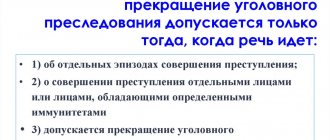Can a theft case be closed before trial?
Art. 76 of the Criminal Code of the Russian Federation states that a criminal can be released from criminal liability in connection with reconciliation with the injured party. To do this, several conditions must be simultaneously met:
- the offender committed the crime for the first time;
- the act falls under minor or moderate gravity;
- The harm caused by the offender to the victim must be fully compensated.
Theft is qualified under Art. 158 of the Criminal Code of the Russian Federation. Part one of the said article establishes liability for crimes of minor gravity, part two - for acts of moderate gravity. Thus, it is possible to release the offender from criminal liability for theft.
In order to terminate a criminal case, an investigator (with the consent of the head of the investigative department) or an investigator (with the consent of the prosecutor) on the basis of a petition from the victim or his legal representative has the right to terminate a criminal case against a person suspected or accused of committing a crime under Part 1 or Part 2 of Article 158 of the Criminal Code of the Russian Federation in connection with the reconciliation of the parties, that is, if the criminal, for example, returned a stolen bicycle to you, and you no longer have material claims against it.
Note!
It will not be possible to simply withdraw a theft statement filed with the police, because Art. 158 of the Criminal Code of the Russian Federation is a matter of public prosecution, and a document can only be taken away in a case of private prosecution.
Judicial process: publicity, spontaneity, orality
The stages of the proceedings are formed as follows:
- preparatory stage;
- review of existing materials;
- debate;
- results of the investigation;
- final decision.
Immediacy, orality, publicity - the principles of the first criminal procedure code of the RSFSR, as amended in 1922, which existed until 1960. These principles are also inherent in modern procedural law.
Article 240 of the Code of Criminal Procedure states: all materials attached to the case must be directly examined. The court takes into account the statements of the parties to the case, information from witnesses, the conclusions of relevant examinations, the presence or absence of material evidence, and reads out the recorded documents.
This is the immediacy of the judicial process. It is thanks to this that the court receives all the necessary information with the help of which the proceedings are carried out. An important aspect of judicial clarification is the judge's personal interpretation of the facts of the case.
It is impossible to include evidence that was not presented in court and does not have a record of the investigation into the facts of the investigation. The spontaneity of the process is necessary for the court to reach an independent verdict in a criminal case.
Orality is a distinctive feature of the judicial process and one of the main aspects of legal proceedings in the Russian Federation. For the best perception of information by all participants in the process, the details of the case should be disclosed orally. The main steps of the process usually take place through written materials. The trial is carried out orally. This allows for the direct participation of all persons involved in the process, as well as an accessible understanding of the facts of the case for all those present at the trial.
Another important factor in the trial is transparency. This element is inherent in every forensic study. A closed meeting is held in exceptional cases that comply with the law.
A trial is considered closed for one or more reasons:
- The crime in question may lead to the dissemination of information treated as a state secret.
- The persons participating in the proceedings are under sixteen years of age.
- Proceedings in cases concerning sexual integrity, honor and dignity of a citizen.
- The case is dangerous for the participants in the process, therefore, in order to ensure their safety, the meeting is scheduled behind closed doors.
A closed trial takes place strictly in accordance with all legal rules of legal proceedings. A private court hearing can take place for a separate part of the case or the entire case. For a closed hearing, fill out a sample request for a closed trial.
Appeal against the decision
The verdict of the trial is not final and is subject to appeal. You can express disagreement within ten days from the announcement of the judicial opinion. An appeal helps mitigate the sentence and can overturn it.
If the judicial conclusion has entered into force on legal grounds, then the appeal takes place through the cassation and supervisory procedures within one year. Supervisory procedure involves checking the legality of a procedural decision.
After the expiration of one year, the period can be restored by going to court with attached evidence of valid reasons.
If the court ruling has not entered into legal force, you can appeal the decision through the appellate procedure. The complaint is filed through the court that issued the sentence. Issued in strict accordance with the sample. The first court considers the complaint according to the legislative rules of legal proceedings.
Grounds and procedure for making decisions during the trial, recording the meeting
At the end of the court hearing, the court may suspend the case due to:
- involving the offender in administrative penalties;
- with the transfer of the case materials for consideration to a comrades' court;
- with a referral to the commission on juvenile affairs;
- with the release of the defendant on bail.
These grounds are interpreted as non-rehabilitative.
According to the law, the court forms a decision after a judicial clarification of the circumstances of the crime, debates between the parties, and testimony of witnesses. Suspension of the case on non-rehabilitating grounds releases the accused from criminal liability. The conclusion of the case by the court carries an unambiguous conclusion about the guilt or innocence of the person who committed the act. There is a wide range of court decisions reflecting individual judicial actions.
This list includes:
- challenges of participants in the case;
- calling previously unreported witnesses;
- changing the decision on punishment;
- resumption of examination;
- removal of the accused from the courtroom;
- allowing other persons to participate in the judicial investigation.
The procedure for making decisions occurs in the form of two procedures for making decisions in court. The first procedure is carried out through a deliberation room, after which the court provides a final decision.
One of the following decisions can be made:
- resolution on additional study of the case materials;
- initiation of a new criminal trial;
- appointment of examination;
- adjournment of judicial review;
- definitions based on any nuances.
All other orders may be heard in the courtroom. The decision made on the spot is formed by the judge orally and entered into the protocol.
The protocol must reflect all materials and identities of the participants in the case. The progress of the proceedings is described in detail. All actions of the participants in the case, testimony of witnesses, comments of judges, and the final verdict are noted in sequential order. The last words of the accused are also briefly and meaningfully noted. The protocol must accurately reflect every question asked by the court, the prosecution, the defense, as well as all the evidence presented in the case, examinations, and facts of the commission of the act.
Reconciliation
Reconciliation of the parties to crimes classified under Part 1 and Part 2 of the Criminal Code of the Russian Federation is possible at any stage of the criminal process: both during the inquiry (investigation) and during the trial of the case. However, as practice shows, the number of cases of termination of criminal cases at the pre-trial stages has been reduced to almost zero. For the most part, this is due to the fact that law enforcement agencies need good statistics on the referral of cases of solved crimes to court.
According to the requirements of the law, the injured party can file a petition to terminate the criminal prosecution of the accused. At the same time, she will need to justify her appeal: describe the amount of damage compensated, whether the offender made an apology, etc.
Let us highlight some key aspects of the reconciliation procedure in court:
- the victim submits a written statement directly to the judge, and a decision on it is made after examining all the materials of the case;
- the judge asks the participants in the process about the possibility of applying the provisions of Art. 25 of the Code of Criminal Procedure of the Russian Federation, including the accused. If the latter is against (this happens extremely rarely), the court agrees with his position and refuses reconciliation. The opinions of other participants are heard, but are not binding;
- the perpetrator is obliged to write a statement of agreement with the termination of the case due to reconciliation with the injured party, while a record of awareness with the consequences for him is mandatory.
Note!
A court decision to refuse to satisfy an application to terminate a criminal case in connection with the reconciliation of the parties or to satisfy it can be appealed within 10 days by all participants in the process: the defendant, the defense attorney, the state prosecutor, the victim.




